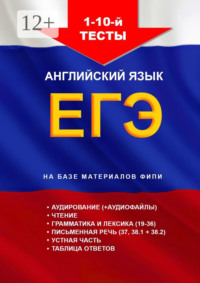
1 – 10-й тесты, aнглийский язык, ЕГЭ, на базе материалов ФИПИ
5. which was the name of the company that sponsored it
6. that comes with the prize
7. they think should be included
Ответ… A – B – C – D – E – F
Прочитайте текст и выполните задания 12—18. В каждом задании запишите в поле ответа цифру 1, 2, 3 или 4, соответствующую выбранному Вами варианту ответа.
His Own Medicine
After graduating from medical school, Eugene Alford built a lucrative career as an ear, nose, and throat specialist and a facial plastic surgeon at Methodist Hospital. In the summers, he and his wife Mary, a dentist and former pediatric nurse, would join a church-sponsored medical mission to Honduras, where he operated on the needy in a rural clinic.
At home, Alford treated many prominent Houston residents, but he also waived his fee for less fortunate patients. Carolyn Thomas, for instance, went to see him with a large gauze bandage over a cavity in her face. She had been shot by her boyfriend, who had also killed her mother. The bullet had blown away Thomas’s nose, upper jaw, and right eye. Reconstruction would have cost a million dollars, but Alford, his medical team, and his hospital did it for free.
Whenever Alford needed to relax after a particularly gruelling period of work, he’d drive to his ranch in Bellville and lose himself in farm chores. He didn’t make it out there as often as he would have liked. As a plastic surgeon at Methodist Hospital, he had performed 800 operations over the previous year and was booked solid for months ahead.
So on a chilly Sunday a few days after Christmas, Alford headed out through the pine bush, intending to clear a trail for deer hunting. As he cut through underbrush in the south pasture, Alford brought the tractor to a halt in front of a dead white oak standing in his path. He nudged the trunk with the tractor’s front-end loader, expecting the tree to topple neatly to the ground. Instead the top half of the oak swayed towards him. In seconds, more than a ton of hardwood slammed down on him, crushing his spine.
Pinned to the steering wheel, Alford could barely breathe. He tried to hit the brakes, but his legs failed to respond. When he found he could move his hands, he turned off the ignition, then with great effort pulled his cell phone from his shirt pocket and called his wife on speed dial. «Mary,» he gasped, «a tree fell on me. I’m going to die.» «Don’t quit!» she shouted. «We’re coming to get you!» Alford was still conscious when his neighbours Kevin and Snuffy, alerted by Mary, hauled the tree off him. A rescue helicopter touched down minutes later, and Alford advised the paramedics on which drugs to administer to him. Then he blacked out.
He was flown to the trauma unit at Medical Centre in Houston, then quickly transferred to Methodist. The operation was successful, but the patient was still in danger. After almost two weeks in the ICU, Alford awoke, and his condition improved enough for him to be taken to a rehabilitation unit, where he began physical therapy and learned to use a wheelchair. In February 2008, six weeks after the accident, Alford returned to his 100-year-old home in Houston. At first, he was so weak that he could sit up only when strapped into a wheelchair.
Before the accident, Alford had been a solidly built six-footer and was used to being in charge. Now, entirely dependent on others, he fell into despair. «If it weren’t for my wife and kids, I would have killed myself,» he says. But then the love started pouring in. Alford’s brother maintained a blog to provide updates about Alford’s recovery. Over the next three months, he received 40,000 messages from colleagues, former patients, acquaintances, even strangers. The outpouring raised his spirits. It also gave Mary a new perspective on him. For years, Alford’s schedule of 15-hour days hadn’t left him much time for her and the kids. «I’d just about decided you liked work more than us,» Mary told him one day over lunch. «But now I realize you didn’t want to leave the hospital because there were so many folks that needed you. You couldn’t just abandon them.»
The couple refurbished their house with ramps, a wheelchair-accessible bathroom, and an elevator. They bought an extended-cab pickup truck and fitted it with a wheelchair hoist, a swivelling driver’s seat, and hand controls so Alford could drive himself.
But Alford’s goal was to make such adjustments temporary. After a month of physical therapy, he graduated from an electric to a manual wheelchair. The daily workouts built strength in his back and abdominal muscles, improving his ability to hold himself upright. Soon he was able to stand with the aid of a tubular steel frame; seated in his chair, he could now draw his legs toward his chest.
In May, Alford began the next phase of treatment. By putting a paralyzed patient through his paces, therapists hoped to grow new neuromuscular connections. After three months of this routine, Alford’s coordination had improved markedly. He felt ready to pick up a scalpel again, with the hospital’s approval. Alford still goes for four hours of rehab every morning and spends his evenings stretching and riding a motorized stationary bike to keep muscle spasms at bay. But in the hours between, he sees patients or performs surgeries – as many as five a week.
He’s eager to do more complex surgeries and plans to increase his workload. Walking remains uncertain. «I always tell him if I had a crystal ball, I’d be a millionaire,» says Marcie Kern, one of his physical therapists. Still, the doctor considers himself a lucky man.
12 Eugene Alford…
1) treated only prominent Houston residents.
2) did some charity work.
3) had fixed fees.
4) often visited his ranch in Bellville.
Ответ:
13 In paragraph 3 «gruelling’ means…
1) extremely boring.
2) quite exciting.
3) very tiring.
4) highly uncomfortable.
Ответ:
14 As a result of the accident, the oak broke Alford’s…
1) neck.
2) legs.
3) back.
4) chest.
Ответ:
15 Before the accident, Alford…
1) was in charge of the hospital.
2) liked his work more than his family.
3) worked 15 hours a week.
4) could not spend much time with his wife and children.
Ответ:
16 To make Alford feel more comfortable…
1) the family equipped their house with necessary facilities.
2) his 100-year-old house was redecorated.
3) the family bought a new house.
4) his old pickup truck was fitted with a wheelchair hoist.
Ответ:
17 After physical therapy and daily workouts…
1) Alford didn’t need a wheelchair.
2) Alford’s stamina came back.
3) Alford started to perform simple operations.
4) Alford‘s coordination improved markedly.
Ответ:
18 At present Alford…
1) feels sorry for himself.
2) is planning to practise medicine as well as he used to.
3) is going to start walking.
4) wants to become a millionaire.
Ответ:
По окончании выполнения заданий 10—18 не забудьте перенести свои ответы в БЛАНК ОТВЕТОВ №1! Запишите ответ справа от номера соответствующего задания, начиная с первой клеточки. При переносе ответов на задания 10 и 11 цифры записываются без пробелов, запятых и других дополнительных символов. Каждую цифру пишите в отдельной клеточке в соответствии с приведёнными в бланке образцами.
Раздел 3. Грамматика и лексика
Прочитайте приведённые ниже тексты. Преобразуйте, если необходимо, слова, напечатанные заглавными буквами в конце строк, обозначенных номерами 19—24, так, чтобы они грамматически соответствовали содержанию текстов. Заполните пропуски полученными словами. Каждый пропуск соответствует отдельному заданию из группы 19—24.

Прочитайте приведённый ниже текст. Образуйте от слов, напечатанных заглавными буквами в конце строк, обозначенных номерами 25—29, однокоренные слова так, чтобы они грамматически и лексически соответствовали содержанию текста. Заполните пропуски полученными словами. Каждый пропуск соответствует отдельному заданию из группы 25—29.
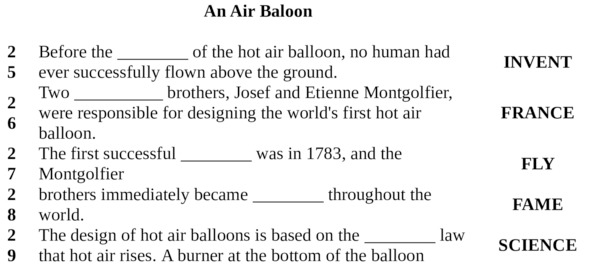
Прочитайте текст с пропусками, обозначенными номерами 30—36. Эти номера соответствуют заданиям 30—36, в которых представлены возможные варианты ответов. Запишите в поле ответа цифру 1, 2, 3 или 4, соответствующую выбранному Вами варианту ответа.
A Shoe Shop Story
Carol Chadbond leant on the counter by the till, chewing gum, and gazed at the customers in the shoe shop. There were only two: a young girl and her mother. They had been 30 ___________ on shoes for twenty minutes, unable to agree on anything. The girl wanted something expensive and fashionable, while the mother wanted something cheap and practical. Carol watched them argue and thought how bored she was.
She wished she hadn’t agreed to stand in for Julie on a Saturday morning. She could be out with her friends now, drinking coffee and gossiping instead of waiting for people to 31 ___________ their minds up. The mother came over with a shoe in her hand.
«I wonder if you have this in a size 4,» she said. Carol took the shoe and smiled the automatic smile she 32 ___________, for customers.
I’ll go and have a look. Won’t be a minute,» she said and went into the storeroom. She quickly found the shoes, then sat on a stool, hoping to waste a few minutes by 33 ___________ to look for the shoes. She thought about her plans for that evening. She was looking forward to going to the cinema and seeing her favourite actor’s latest film. Realising that she hadn’t invited Amy, she got out her mobile and quickly dialled the number. It rang twice before Amy answered.
«Hi, it’s me!» Carol said. «Guess what? I’m at work. Listen, what are you doing later?»
Soon, Amy was telling Carol all about what had happened the night before and who had said what to whom. Forgetting where she was, Carol got more and more 34 ___________ in the
conversation, crying «Really?» and «I don’t believe it!» at the more interesting moments in the story. A low cough came from the door of the storeroom. Carol looked up to see the woman customer standing there with a very annoyed 35 ___________ on her face. Even worse, the shop manager, Mrs Lewis, was standing right behind her.
«Erm… I’ll call you back,» Carol said into the phone, and hung 36 ___________. Somehow, she had the feeling that she might not have to work the following Saturday morning.
30 1) trying 2) wearing 3) getting 4) having
Ответ:
31 1) put 2) make 3) decide 4) cross
Ответ:
32 1) booked 2) reserved 3) held 4) stored
Ответ:
33 1) acting 2) imitating 3) displaying 4) pretending
Ответ:
34 1) involved 2) excited 3) included 4) concentrated
Ответ:
35 1) view 2) look 3) sight 4) appearance
Ответ:
36 1) off 2) out 3) up 4) down
Ответ:
По окончании выполнения заданий 19—36 не забудьте перенести свои ответы в БЛАНК ОТВЕТОВ №1! Запишите ответ справа от номера соответствующего задания, начиная с первой клеточки. При переносе ответов на задания 19—29 буквы записываются без пробелов, запятых и других дополнительных символов. Каждую букву или цифру пишите в отдельной клеточке в соответствии с приведёнными в бланке образцами.
Проверьте, чтобы каждый ответ был записан рядом с номером соответствующего задания.
Раздел 4. Письменная речь
Для ответов на задания 37 и 38 используйте бланк ответов №2. Черновые пометки можно делать прямо на листе с заданиями или использовать отдельный черновик. При выполнении заданий 37 и 38 особое внимание обратите на то, что Ваши ответы будут оцениваться только по записям, сделанным в БЛАНКЕ ОТВЕТОВ №2. Никакие записи черновика не будут учитываться экспертом. Обратите внимание также на необходимость соблюдения указанного объёма текста. Тексты недостаточного объёма, а также часть текста, превышающая требуемый объём, не оцениваются. Укажите номер задания 37 в БЛАНКЕ ОТВЕТОВ №2 и напишите текст своего ответного электронного письма зарубежному другу по переписке.
37. You have received an email message from your English-speaking pen-friend Max:
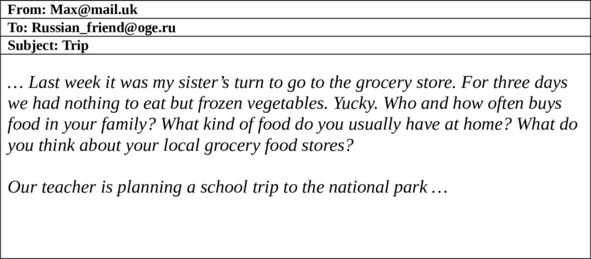
Write an email to Max.
In your message:
– answer his questions;
– ask 3 questions about the trip
Write 100—140 words.
Remember the rules of email writing.
Выберите только ОДНО из двух предложенных заданий (38.1 или 38.2), укажите его номер в БЛАНКЕ ОТВЕТОВ №2 и выполните согласно данному плану. В ответе на задание 38 числительные пишите цифрами.
38.1 Imagine that you are doing a project on what countries teens from Zetland would like to work in. You have found some data on the subject – the results of a survey (see the table below).
Comment on the survey data in the table and give your personal opinion on the subject of the project.
The survey question:
What countries would you like to work in?
Choose one option

Write 200—250 words.
Use the following plan:
– make an opening statement on the subject of the project;
– select and report 2—3 facts;
– make 1—2 comparisons where relevant and give your comments;
– outline a problem that can arise with working in another country and suggest a way of solving it;
– conclude by giving and explaining your opinion on the importance of working in another country.
38.2 Imagine that you are doing a project on why the social network VK is popular in Zetland. You have found some data on the subject – the results оf a survey (see the pie chart below).
Comment on the survey data in the pie chart and give your opinion on the subject of the project.
The survey question:
Why do you spend time in VK?
Choose one option
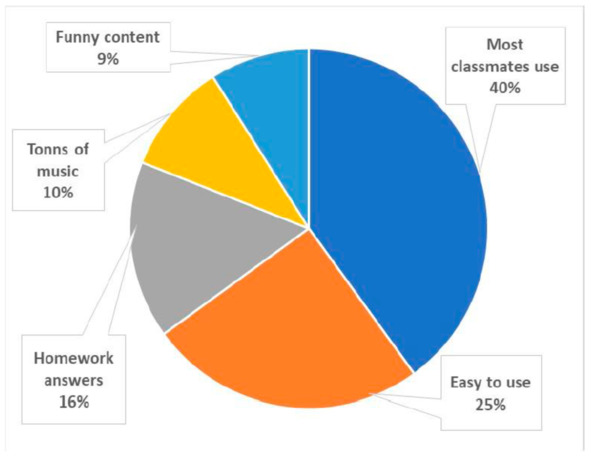
Write 200—250 words.
Use the following plan:
– make an opening statement on the subject of the project;
– select and report 2—3 facts;
– make 1—2 comparisons where relevant and give your comments;
– outline a problem that one can face when using VK and like and suggest a way of solving it;
– conclude by giving and explaining your opinion on the importance of VK in teens’ life.
Проверьте, чтобы каждый ответ был записан рядом с номером соответствующего задания.
Test 3. Устная часть
Task 1
Imagine that you are preparing a project with your friend. You have found some interesting material for the presentation and you want to read this text to your friend. You have 1.5 minutes to read the text silently, then be ready to read it out aloud. You will not have more than 1.5 minutes to read it.
21st century skills comprise abilities, and learning dispositions that have been identified as being required for success in the modern-day society and workplaces by educators, business leaders, academics, and governmental agencies. This is part of a growing international movement focusing on the skills required for students to master in preparation for success in a rapidly changing, digital society. Many of these talents are also associated with deeper learning, which is based on mastering analytic reasoning, complex problem solving, and teamwork. These skills differ from traditional academic training in that they are not primarily content knowledge-based. The above-mentioned abilities are also identified as key qualities of progressive education, a pedagogical movement that began in the late nineteenth century and continues in various forms to the present.
Task 2
Study the advertisement
Touch the Culture of World Civilizations
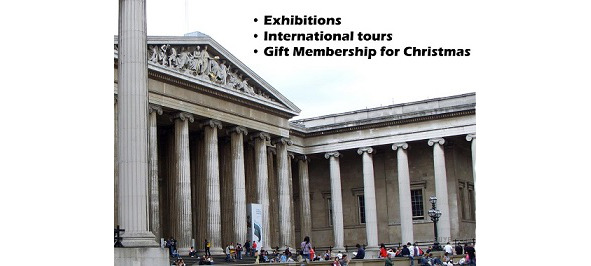
You are considering visiting a museum and you’d like to get more information. In 1.5 minutes you are to ask four direct questions to find out the following:
1) location of the museum
2) boking a guided tour
3) number of exhibitions
4) working hours
You have 20 seconds to ask each question.
Task 3
You are going to give an interview. You have to answer five questions
Give full answers to the questions (2—3 sentences).
Remember that you have 40 seconds to answer each question.
Typescript for Task 3
Interviewer: Hello everybody! It’s Teenagers Round the World Channel. Our guest today is a teenager from Russia and we are going to discuss friends. We’d like to know our guest’s point of view on this issue. Please answer five questions. So, let’s get started.
Interviewer: How do you get along with your peers?
Student: _________________________
Interviewer: What are the benefits of friendship?
Student: _________________________
Interviewer: Where did you meet your best friend? How long have you known each other?
Student: _________________________
Interviewer: How do you communicate with your friends?
Student: _________________________
Interviewer: How do you spend time together?
Student: _________________________
Interviewer: Thank you very much for your interview.
Task 4
Imagine that you and your friend are doing a school project «Kind of transport». You have found some photos to illustrate it, but for technical reasons you cannot send them now.
Leave a voice message to your friend explaining your choice of the photos and sharing some ideas about the project.
In 2.5 minutes, be ready to:
• explain the choice of the illustrations for the project by briefly describing them and noting the differences;
• mention the advantages (1—2) of the two types of transports;
• mention the disadvantages (1—2) of the two types of transports;
• express your opinion on the subject of the project – which way of transport, presented in the pictures you’d prefer and why.

You will speak for not more than 3 minutes (2—3 sentences for every item of the plan, 12—15 sentences total). You have to talk continuously.
TEST 4
Раздел 1. Аудирование
1. Вы услышите 6 высказываний. Установите соответствие между высказываниями каждого говорящего A—F и утверждениями, данными в списке 1—7. Используйте каждое утверждение, обозначенное соответствующей цифрой, только один раз. В задании есть одно лишнее утверждение. Вы услышите запись дважды. Занесите свои ответы в таблицу.
1 This ingredient of a sweet treat has a long history.
2 Special sweets can be decorations for special occasions.
3 Candy from our childhood has a very special taste.
4 Every candy cane has its own sweet secret.
5 I didn’t regret spending money for those sweets.
6 It was impossible to eat alone all the sweets needed.
7 This shop has an unusual mix of goods.
Говорящий… A – B – C – D – E – F
Утверждение
2. Вы услышите диалог. Определите, какие из приведённых утверждений А—G соответствуют содержанию текста (1 – True), какие не соответствуют (2 – False) и о чём в тексте не сказано, то есть на основании текста нельзя дать ни положительного, ни отрицательного ответа (3 – Not stated). Занесите номер выбранного Вами варианта ответа в таблицу. Вы услышите запись дважды.
A Sandra has been friends with Anna for a long time.
B Jim and Anna have good relations at the moment.
C Jim feels guilty about his behavior towards Anna.
D Jim has a full-time job.
E Jim thinks gift certificates don’t make a good present.
F Sandra has already bought a present for Anna.
G Jim and Sandra are going shopping tonight.
Утверждение … … ….. A – B – C – D – E – F – G
Соответствие диалогу
Вы услышите интервью. В заданиях 3—9 запишите в поле ответа цифру 1, 2 или 3, соответствующую выбранному Вами варианту ответа. Вы услышите запись дважды.
3 Speaking about his background, Nigel says that…
1) he decided to become a pilot at an early age.
2) his family was related to aviation.
3) it took him quite long to understand that he wanted to fly.
Ответ:
4 At present, Nigel’s main ambition is to work on…
1) local flights.
2) trans-Atlantic flights.
3) popular international flights.
Ответ:
5 When Nigel decided to get a pilot’s license, he had to…
1) leave school to work.
2) change many jobs.
3) combine work and studies.
Ответ:
6 Nigel explains that «to get instrument rating» means to demonstrate the ability to…
1) operate any type of aircraft.